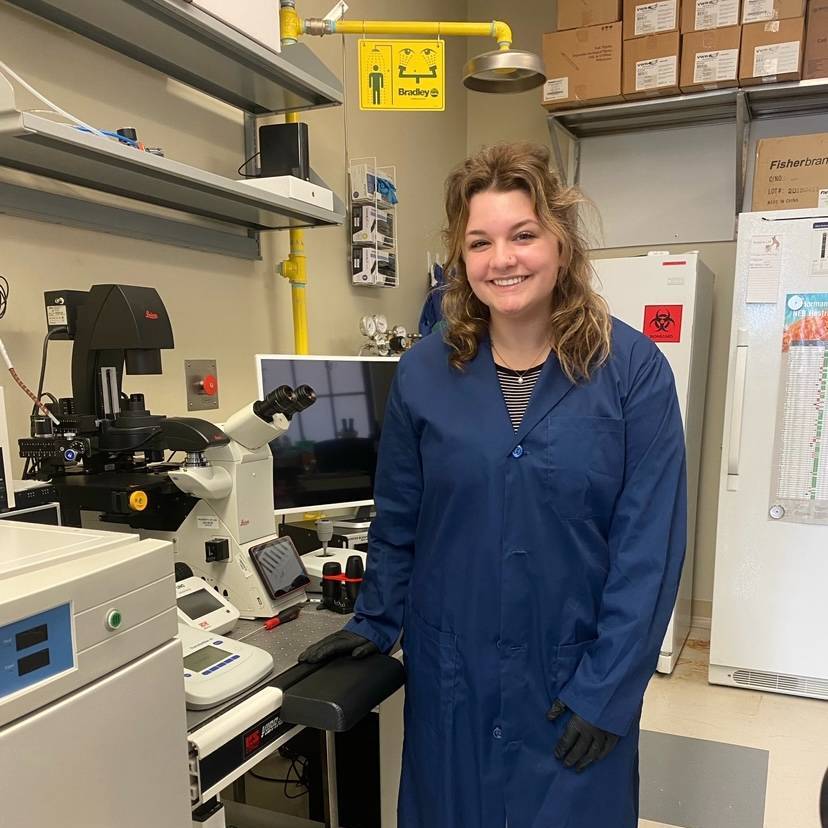Undergraduate Summer Research: Animal Sciences & Technology Student Sophie Kate LeBlanc
October 09, 2023
Conducting research over the summer through LSU Discover, Research Experiences for Undergraduates (REUs) or other means is a great way to get course credit toward your major and professional experience for your resume. Learn more about LSU undergraduate student Sophie Kate LeBlanc's summer research project.
My Summer Studying Reproductive Biotechnology

Summer Research is great way to explore more fully your major and get course credit through an internship or paid job. Learn more how LSU student Sophie Kate LeBlanc spent her summer doing pre-veterinary research in reproductive biotechnology.
– Photo Credit: Sophie Kate LeBlanc
Name: Sophie Kate LeBlanc
Classification: Senior
Hometown: Denham Springs, LA
Major: Animal Sciences and Technology
What type of research did you conduct over the summer?
During mammalian reproduction, there is complex communication between the developing
conceptus (embryo and extra-embryonic tissues) and the maternal uterus. In several
livestock species such as cows, sheep, and pigs, there is a process before implantation
known as conceptus elongation. If the conceptus does not elongate enough, the pregnancy
will be lost. To date, elongation has not been recapitulated in the lab (in vitro),
unlike earlier developmental events. However, many studies show that certain metabolites
in uterine fluid are likely important to elongation. Our hypothesis is that supplementing
these metabolites to in vitro embryo cultures will extend embryo development (conceptus
elongation) in the lab.
This project is currently ongoing. If successful, this work could improve livestock
reproductive efficiency, which is a main driver of farm profitability. Additionally,
understanding this process is transferable to other agriculturally relevant species.
Lastly, improving cattle pregnancy rates may positively impact greenhouse gas emissions,
resulting in a more sustainable animal agriculture industry. Moreover, most of our
knowledge of early embryo development comes from studies using mice. Although bovine
and human reproduction differ in many ways, a better understanding of large animal
embryology may be transferrable to aspects of human medicine and IVF applications.
Where did you do your research internship?
After taking an embryology lab course in the School of Animal Sciences, I wanted to
become more involved with research. I reached out to Dr. Simintiras about opportunities
in his lab, and after discussing my interests and goals, he came up with this project
for me. LSU Discover provides undergraduates with funding for research with a professor
at LSU. With help from Dr. Simintiras, I wrote a grant proposal for the Summer 2023
LSU Discover funding cycle, and we were thrilled to be selected!
What responsibilities did you have in your summer research work?
We successfully produced pig embryos in vitro. This is because we could not get bovine
oocytes (eggs) during the summer. Going forward, we are adding different metabolites
at various concentrations to bovine embryo culture see whether we can achieve conceptus
elongation in vitro.
What did you most enjoy about your project?
I enjoyed so many aspects of my project. I was so excited to see the concepts I learned
in the classroom come to life in the lab. I feel as if this project enhanced my studies
at LSU and showed me the broader impacts that my education has on the world. Every
day I left with a new piece of knowledge and a better understanding of the complexities
of research. I enjoyed the challenges and how detailed-oriented I had to be with everything
I did.
What is the biggest lesson you learned?
Science is rarely what you expect it to be. There will be many challenges to work
through, however the result is always very rewarding!
How did this experience impact your education or goals?
This experience narrowed down where I see my career going. I started with an open
mind to see if it was something I enjoyed, and now I envision myself continuing a
profession involved in research. I was very interested in reproductive biotechnology
coming into this, and I know now I can mix my interests and talents into one field.
Do you have any tips or advice for other LSU students seeking to do summer research?
I would tell anyone thinking about doing research, to go for it! Even if you decide
to not pursue a path within research, you will learn so much! Your concepts in lectures
will come to life.
“ I would tell anyone thinking about doing research, to go for it! Even if you decide to not pursue a path within research, you will learn so much! Your concepts in lectures will come to life. ”
Is there anyone you’d like to thank at LSU for helping to get this summer research
project?
I would like to thank Dr. Constantine Simintiras, Assistant Professor of Reproductive
and Developmental Biology in the School of Animal Sciences, Iebu Devkota, PhD Student,
Zachary Bonomo, PhD Student and the LSU Discover Undergraduate Research Ptogram.
What is next for you?
I graduate in May 2024 and will continue working in Dr. Simintiras’ lab until I graduate.
I just submitted my application to LSU School of Veterinary Medicine. If accepted,
I plan to pursue a career as a research veterinarian or a theriogenologist.


